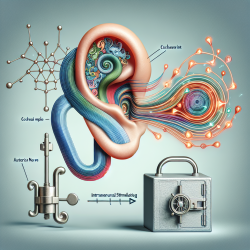In the world of auditory therapy and cochlear implants, understanding how chronic deafness affects temporal acuity is crucial. A recent study titled "Chronic Deafness Degrades Temporal Acuity in the Electrically Stimulated Auditory Pathway" provides valuable insights into this area. This research can help practitioners refine their approaches to auditory stimulation and improve patient outcomes.
The Study's Key Findings
The study conducted by Middlebrooks et al. explored how chronic deafness impacts the temporal acuity of the auditory pathway when stimulated electrically. Using acutely and chronically deafened cats as models, researchers found that chronic deafness leads to a significant reduction in temporal acuity. This was evident from a marked decrease in the maximum rate of electrical cochlear stimulation that neurons could synchronize with.
- Temporal Acuity Loss: Chronic deafness resulted in a dramatic reduction in temporal acuity, as shown by decreased synchronization rates of neurons to electrical pulses.
- Nerve Fiber Loss: There was approximately a 30% loss of auditory nerve fibers in chronically deaf cats compared to those with acute deafness.
- No Significant Threshold Impairment: Despite concerns, there was no significant impairment in excitation thresholds or dynamic ranges due to nerve fiber loss.
Implications for Practitioners
The findings suggest several implications for practitioners involved in auditory therapy:
- Cochlear Implant Optimization: Understanding the impact of chronic deafness on temporal acuity can guide adjustments in cochlear implant settings to enhance frequency selectivity and temporal resolution.
- Future Auditory Prostheses: The study indicates that future prosthetic devices employing intraneural (IN) stimulation might offer better frequency selectivity than current cochlear implants.
- Encouraging Further Research: Practitioners should consider supporting further research into how chronic electrical stimulation might restore or maintain temporal acuity over time.
The Path Forward
This research underscores the importance of continuous innovation and adaptation in auditory therapy practices. By integrating these findings into everyday practice, practitioners can potentially improve outcomes for individuals using cochlear implants or other auditory prostheses.
If you're interested in delving deeper into this subject, I encourage you to read the original research paper: Chronic Deafness Degrades Temporal Acuity in the Electrically Stimulated Auditory Pathway.










